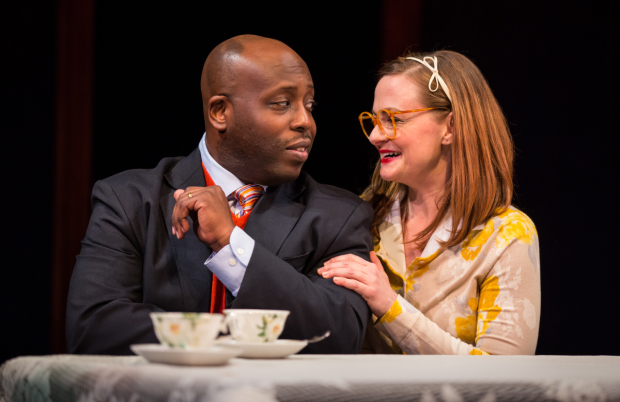
(© Liz Lauren)
Carlyle begins with a video showing the title character (James Earl Jones II) in his dressing room at the Goodman Theatre, moments before he comes onstage. Carlyle's wife, Janice (Tiffany Scott), applies makeup to his face as he frets about what the critics will think of his performance. The immediate wink to the audience sets the tone for what could be an insufferably self-referential satire, but under the clever direction of Benjamin Kamine, Carlyle's play-within-a-play structure rises above its premise.
Carlyle Meyers is a lawyer for the Republican Party. He comes from wealth, he is socially and fiscally conservative, and he is black. He has, at the behest of the Goodman, arranged a performance of his own life story, in part to elucidate why a black person ends up in the Republican party.
Carlyle, however, believes that the very question is problematic. "The question assumes", he says in his opening remarks, "that all black people think alike, talk alike and vote alike, as if all black people are some homogeneous group." Even so, he has assembled a group of actors — plus his own wife, his father (Tim Edward Rhoze), and his friend Omar (Levenix Riddle) — to present vignettes dissecting his path to the GOP. His father was a self-made man and a proponent of personal responsibility and supply-side economics. In prep school, Carlyle finds himself caught between two worlds. At Harvard, he meets his future wife, the WASP daughter of two conservatives (Maureen Gallagher and Patrick Clear) who warm up to Carlyle and his father in no time at all. After he is rejected from Bill Clinton's 1992 campaign offices, Carlyle begins a career with the Republican Party, including placement as a clerk for none other than his personal hero, Clarence Thomas.
As a play, Carlyle never overindulges in self-reflection. Instead, it skims the surface of Carlyle's psyche, and stays comedic throughout its 75-minute run time. This is, after all, only the version of events that Carlyle wants us to see. As Carlyle, James Earl Jones II is a consummate showman, maneuvering very broad material with a light touch. In the only moment in the show where real emotions come out, an adolescent conflict between father and son, Jones and Rhoze share excellent chemistry. As Carlyle's outspoken wife, Scott has mastered the mannerisms of the outspoken yuppie conservative, but rarely rises above cliché. To call her role "underwritten" would be to miss the point of Thomas Bradshaw's script, which skewers the political puff piece. Still, you wish Scott had been given more to work with.
Costume designer Rachel Healy keeps every character in uniform, whether it's a literal school uniform, graduate robes, or something more figurative, like the double-breasted pinstriped suit that signifies old-school Wall Street. A lively scene at the shooting range showcased Christopher Kriz's skills as a lighting designer. Kevin Depinet's set and Heather Gilbert's lighting both seem straightforward, but proved surprisingly versatile.
Carlyle walks a line between timely satire and ludicrous parody, switching between the two modes fast enough to give whiplash. An amusingly plausible scene of in-laws cooing over concealed weapons contrasts with a Second Amendment fever dream that ends with a vigorous push for mandatory civilian armament. The response from the audience was palpable. Even outside of when actors address the audience directly (notably a moment of silence for Antonin Scalia), Carlyle was organically interrupted by spontaneous applause more than once. Ironic, perhaps, that a play meant to send up politicians in general met with such a hearty response. There is no shortage of political satire onstage in Chicago this season, but Carlyle separates itself from the pack.











